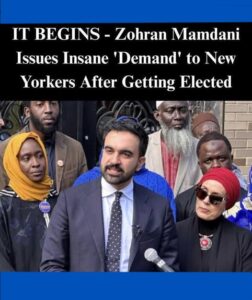Zohran Mamdani Faces Criticism After Asking New Yorkers to Help Fund His Transition

NEW YORK CITY — Just hours after celebrating one of the most closely contested mayoral victories in recent memory, Zohran Mamdani is under fire — not for a policy move, but for an unexpected appeal.
In a short video shared on X (formerly Twitter) Tuesday night, the newly elected mayor thanked his supporters for helping him defeat former Governor Andrew Cuomo and Republican contender Curtis Sliwa. But his message quickly took a turn when he asked for public donations — specifically from ordinary New Yorkers — to help finance his transition into office.
In the two-minute clip, Mamdani, standing before a banner that read “New York for All of Us,” expressed gratitude and determination. “The campaign is over, but the work is just beginning,” he said. “We need the resources to assemble a transition team that reflects our values — to hire policy experts, build our foundation, and make sure we start strong.”
According to his team, the initiative — dubbed a “people-powered transition fund” — aims to ensure his administration remains independent from wealthy donors or corporate lobbyists. Yet, the request quickly ignited fierce debate online.
A Swift Backlash
Within hours, the post had been viewed hundreds of thousands of times and drew an avalanche of criticism. Many accused Mamdani of hypocrisy, arguing that it was tone-deaf for a candidate who ran on promises of free transit, rent freezes, and affordability to now ask for financial contributions — especially from working-class New Yorkers.
“It hasn’t even been 24 hours and he’s already asking for cash,” one X user wrote. “Guess ‘free’ comes at a price.”
Others were more biting: “He said billionaires would pay — not subway riders.”
Critics from across the political spectrum joined in. Some conservatives claimed Mamdani’s appeal exposed the financial flaws in his progressive platform, while moderate Democrats said the timing made him look out of touch.
“Even if it’s well-intentioned, the optics are bad,” said Brooklyn-based strategist Luis Montoya. “You can’t brand yourself as the people’s mayor one day and ask those same people to fund your staff the next.”
Supporters Push Back
Mamdani’s allies argue the criticism misses the point. They say the fundraiser is consistent with his grassroots approach — refusing establishment or corporate backing even during the transition.
“What he’s doing is transparent and ethical,” said Aisha Rahman, a longtime campaign volunteer. “He’s asking the same people who built this movement to help keep it independent. That’s the opposite of corruption.”
Political experts also noted that transition fundraising isn’t unusual. Many newly elected officials — including governors and mayors — raise money to cover staffing, research, and logistical expenses in the period between election and inauguration.
“The controversy is more about perception,” explained Dr. Henry Calloway, a political science professor at Hunter College. “Transition funds are standard. But because Mamdani built his brand on rejecting the political norm, even a normal step can seem contradictory.”
Still, he acknowledged that the optics are crucial, especially in a city where inequality and housing affordability defined the campaign.
Economic Promises and Political Reality
Throughout his campaign, Mamdani, 33, made bold economic pledges: free public transit, a citywide rent freeze, and higher taxes on the wealthy to fund expanded public services.
These promises galvanized younger, working-class voters who felt ignored by traditional politics — but also fueled skepticism about how such plans would be paid for.
During the race, Mamdani often urged supporters to give only small donations, declaring that his campaign was “for the workers, not the wealthy.” That message resonated deeply in neighborhoods across Queens, the Bronx, and Brooklyn — the same communities now divided over his fundraising appeal.
“He said billionaires would foot the bill,” said Queens small business owner Anthony Ruiz. “Now he’s turning to regular folks for help. It doesn’t add up.”
From Movement to Management
The episode highlights a central challenge for Mamdani as he transitions from activist to administrator — transforming lofty ideals into workable policy.
In his announcement, Mamdani said his transition team would be diverse, community-driven, and independent. “Our strength is our integrity,” he said. “We won’t compromise that by taking corporate money.”
Whether voters view that as principled or naïve remains to be seen.
Divided Reactions
Public opinion is split. Some see the move as a refreshing act of transparency. Others view it as political miscalculation.
“He’s still campaigning when he should be governing,” said political commentator Tanya Lowell. “It’s his first leadership test — whether he can turn his rhetoric into results.”
But others defended the gesture. “At least he’s upfront,” said Peter Gibbons from Staten Island. “Every mayor needs funds to get started. He’s doing it in the open, not behind closed doors.”
Looking Ahead
As Mamdani prepares to take office in January, the controversy underscores the delicate balance between principle and pragmatism.
If his transition succeeds, it could mark a new model for grassroots leadership in America’s biggest city. If it stumbles, it could validate critics who see his ideals as inspiring but impractical.
For now, Mamdani remains resolute.
“We made history together,” he posted. “Now it’s time to build the future — together.”